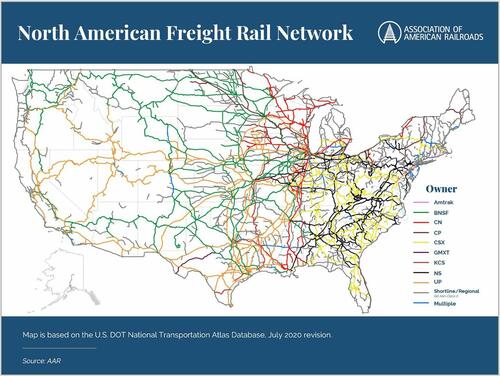US Railroads Enact “Contingency Plans,” Preparing For Labor Strike As Union Talks Fail
Railroads and labor unions worked through the weekend to make a deal. There were little signs of progress, and rail companies are now taking steps Monday to secure shipments of hazardous and security-sensitive materials “in light of the possibility of a rail labor strike,” the Association of American Railroads (AAR) wrote in a statement.
On Sunday, Norfolk Southern released a statement detailing it had “begun enacting its contingency plans for a controlled shut down of our network at 00:01 on Friday, Sept. 16.” The railroad said two labor unions are holding out on new contracts, “we still do not have a commitment not to strike and must act accordingly,” adding, “Our goal is to ensure that in the event of a work stoppage, crews, equipment, and freight safely reach their destinations with minimal disruption.”
Union Pacific and CSX also announced contingency plans for a possible work stoppage. BNSF told customers to call Congress so lawmakers on Capitol Hill can “intervene to prevent or quickly resolve the service disruption” if a labor strike materializes on Friday. The railroad also said: “We will begin to take steps to manage and secure the shipments of hazardous and security-sensitive materials as early as Monday.”
Rail freight networks are the arteries of the US economy.
Two months ago, the Biden administration imposed a two-month cooling-off period is set to expire at 12:01 am ET on Sept. 16 — after that — President Biden didn’t have the power to prevent a strike among two labor unions that had yet hammered out a deal with railroads. Only Congress can intervene after the cooling period expires.
Bloomberg said the two unions include the Brotherhood of Locomotive Engineers and Trainmen and the International Association of Sheet Metal Air, Rail and Transportation Workers, accounting for more than 90,000 rail employees. Ten of the other unions have already struck a deal with railroads.
Association of American Railroads warned that a railroad strike could cost the US economy upwards of $2 billion per day, while disruption wouldn’t be good optics for the Biden administration ahead of the midterm elections in November.
Bloomberg Intelligence analyst Lee Klaskow pointed out that BNSF and Union Pacific account for 45% of Class I intermodal traffic, while CSX and Norfolk Southern has 31%.
According to government data, about 29% of all US freight moves on the rails. Half the cargo is bulk commodities, such as energy, food, chemicals, metals, and wood productions — the other half is shipping containers of consumer goods.
“Even a temporary interruption would create a devastating ripple effect” across US supply chains, American Bakers Association, a Washington-based trade group representing more than 300 companies, warned.
Even if there’s no strike, rail networks are already clogged. Shipping line Maersk recently suspended import bookings through Fort Worth, Texas, due to “severe congestion” in railyards.
Railroads are preparing for possible work stoppages at the end of the week if the two unions can’t formulate a deal. There’s the possibility Congress could intervene before the cooling period expires. If not, then expect a flare-up in snarled supply chains.
Tyler Durden
Mon, 09/12/2022 – 08:45

